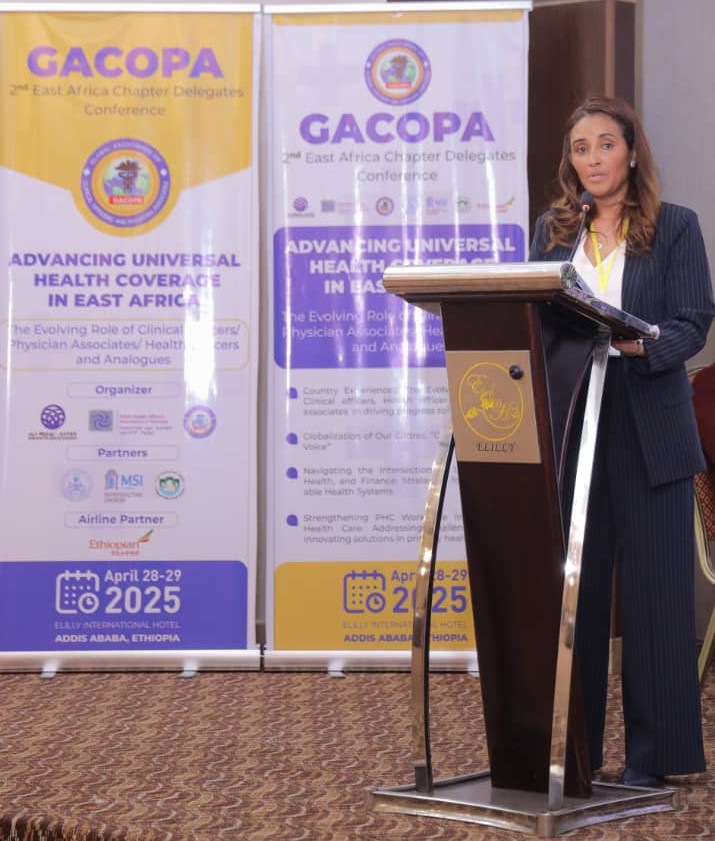

Your Excellency Dr Ayele Teshome: State Minister of Health, Federal Democratic Republic of Ethiopia
Honorable (RTD)Prof Dhadho Godhana Governor of Tana River Kenya
Mr Austin Odour, President of the Global Association of Clinical Officers and Physician Associates (GACOPA)
Honorable Guests, Esteemed Colleagues, and Dedicated Public Health Officers, Clinical Officers, and Physician Associates—especially those who have traveled from Kenya, Uganda, Zambia, and South Africa to be with us today—your presence is deeply appreciated.
Welcome to the Second GACOPA East Africa Delegates Conference. It is both an honor and a privilege to have you here for this groundbreaking event, held under the theme “Advancing Universal Health Coverage in East Africa: The Evolving Role of Clinical Officers, Physician Associates, Health Officers, and Analogues.”
Today, we are gathered not just as health professionals, but as a united front—committed to reshaping healthcare delivery across our region. This audience represents the full spectrum of expertise—clinical officers, policymakers, educators, and advocates—all aligned with a common purpose: to ensure accessible, high-quality healthcare for every person, regardless of where they live.
The history of public health officers in Ethiopia is a powerful story of innovation, adaptation, and evolution—a journey that spans over seven decades. It began in 1954 with the establishment of the Public Health Officer Training Program at the College of Public Health in Gondar, Ethiopia, initiated by the Ministry of Health (MoH) to address a critical shortage of doctors. This groundbreaking initiative laid the foundation for a uniquely Ethiopian workforce model—designed to reach underserved communities and strengthen the health system from the ground up.
What started as a solution to rural health inequities has since evolved into a nationwide health workforce. Today, more than 12,000 trained health officers, graduated from 26 public and 53 private higher education institutions, are serving in diverse roles as the backbone of primary healthcare in both urban and rural areas. They lead in clinical, public health, and administrative roles—including hospital CEOs, medical directors, researchers, educators, nonprofit leaders and private sector leaders—making a lasting impact on the country’s health system.
Over these seven decades, the role and training of health officers have continually adapted to Ethiopia’s changing healthcare landscape. At different times, the emphasis has shifted between curative services and preventive, promotive care—always in response to community needs, disease patterns, and national health priorities. The health officer curriculum has remained a flexible and strategic tool, evolving to meet demands arising from healthcare reforms, shifting policy, and ongoing workforce shortages. One clear example of this adaptability is the introduction of the Integrated Emergency Surgical Officers (IESO) program, a timely innovation aimed at addressing critical gaps in emergency surgical care.
This 70-year legacy is a testament to the resilience and relevance of public health officer profession—a profession that continues to lead, respond and shape the future of primary healthcare delivery in Ethiopia.
This Conference brings a timely and vital focus to our evolving roles and the path toward universal health coverage (UHC). Through our deliberations, we will explore country experiences that demonstrate how clinical officers, health officers, and physician associates are driving progress on the frontlines of UHC. We will engage in critical discussions around the globalization of our cadres and the power of unity under the rallying call: “One Cadre, One Voice.”
While we have much to be proud of, we must also confront the challenges that persist. Career progression especially the clinical career pathway, harmonized curriculum implementation, and adequate professional recognition remain hurdles for many in our field. In response, the Public Health Officers Association of Ethiopia in collaboration with the Ministry of health has taken proactive leadership in developing and revising a career roadmap tailored to our context, The implementation of the endorsed career roadmap has faced prolonged delays, turning what was once a clear vision into a distant dream for health officers across every corner of the country.
Achieving universal health coverage is impossible without a strong, well-supported, and recognized healthcare workforce. And that is why our theme—Advancing UHC through the evolving roles of our cadres—is not just timely, but urgent.
Remember: we share more than just borders. We share disease burdens, cultural values, and a common purpose. To achieve our goals, we must engage deeply, collaborate boldly, and grow collectively. That is not only our conference motto—it is our professional mandate.
In closing, I would like to express our sincere gratitude to the sponsors who generously stepped in to make this event possible. A special thanks to the Ministry of Health Ethiopia, particularly the Human Resources for Health Development and Improvement LEO, the Ethiopian Public Health Institute, Ethiopian public health association, and MSI Ethiopia Reproductive Choices. Your invaluable partnership has been instrumental in making this important conference a reality.
On behalf of the Public Health Officers Association of Ethiopia and all organizing stakeholders, I warmly welcome you to this Conference. I hope our time together inspires new ideas, builds lasting partnerships, and brings us closer to a healthier and equitable East Africa.
Thank you and wish you a productive conference.
Eyob Salemot
Ethiopia Correspondant




